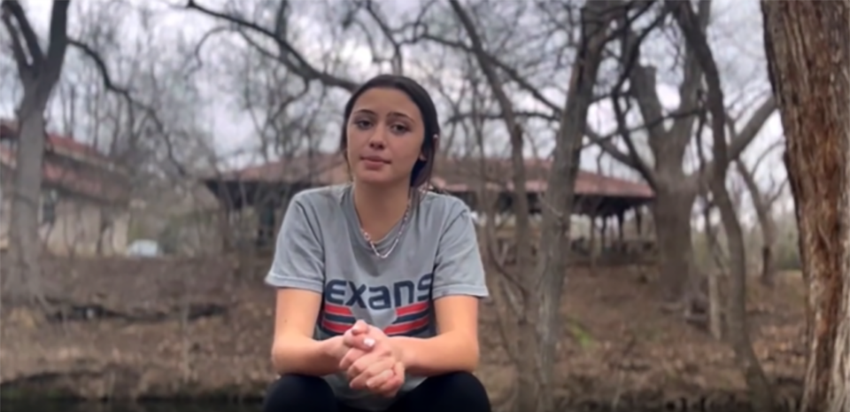A shot from a Wimberley ISD student’s Slingshot Challenge video, discussing the Edwards Aquifer and One Water systems for school buildings. (Courtesy of Kelly Albus.)
Thanks to tireless schoolteachers, students’ ingenuity and hard work, and support from Texas A&M AgriLife professionals, this spring hundreds of middle and high school students in Texas produced educational videos about environmental science for the National Geographic Slingshot Challenge.
Kelly Albus, Ph.D., a research scientist for the Texas Water Resources Institute, TWRI, received National Geographic funding support to serve as the Slingshot Challenge Supporter for the entire state of Texas. Albus trained teachers in how to use the challenge to complement state-mandated teaching objectives for science courses and advanced placement environmental sciences courses, and she helped teachers connect students to local environmental issues to feature in video projects.
“The slingshot challenge invited 13-18-year-olds to use their voice to tackle the planet’s most pressing environmental issues,” said Albus, who is part of TWRI’s Urban Water Innovation and Sustainability Hub (Urban WISH) team at the Texas A&M AgriLife Research and Extension Center at Dallas. “It was a lot more than just creating a video – these students were so proactive and creative. They said, ‘What’s around me, what can I do to help,’ and as a result, many of them learned about environmental issues through a local lens.”
Awards for the challenge were announced last week, and a Houston student received multiple Slingshot Challenge and People’s Choice Award recognitions for a video titled “The 15-Minute City.”
Lindsay O’Gan, a middle school teacher in Wimberley Independent School District, used the challenge as an opportunity to engage her students in citizen science and experiential learning, Albus said. O’Gan learned about the challenge because she attended a Water ACCESS Teacher Workshop taught by Albus earlier this year.
All 115 of O’Gan’s 8th grade science students created a video for the challenge. As a result, many of the students learned about water quality impairment issues in local streams and creeks in Wimberley, and they got involved in organizations working to improve the waterbodies.
“The students learned about a stream that has a bacteria problem, and now the community is working together to improve it,” Albus said.
After helping students and teachers in numerous school districts around the state complete the Slingshot Challenge, she looks forward to continuing supporting science educators.
“At all of our teacher workshops, we teach local, place-based learning and citizen science, using water quality testing and low-cost, accessible materials to increase diversity with science participation,” Albus said. “Place-based learning and citizen science are fantastic ways to really teach students and facilitate open-ended learning. They learn how to follow research to its end, and students get to do their own projects and find their own voice, which makes a higher impact on learning. This also impacts students’ life behaviors, which in turn can impact environmental quality.”
Two of O’Gan’s students worked together to produce a video about water conservation in the Edwards Aquifer region and the impact that schools with One Water systems can make.
“Teachers leave our workshops feeling more empowered to empower students, and that results in students taking more initiative and more ownership of their projects,” Albus said.
This summer she will be hosting two ACCESS Water Teacher Workshops: June 21 in Tarrant County, for Master Volunteers; and, July 12 in Tarrant County, for teachers and educators.
To learn more about the workshops, visit tx.ag/ACESSWaterWorkshops, or contact Albus at kelly.albus@ag.tamu.edu or 972-231-5362.
TWRI is a unit of Texas A&M AgriLife Research, the Texas A&M AgriLife Extension Service and the College of Agriculture and Life Sciences at Texas A&M.


